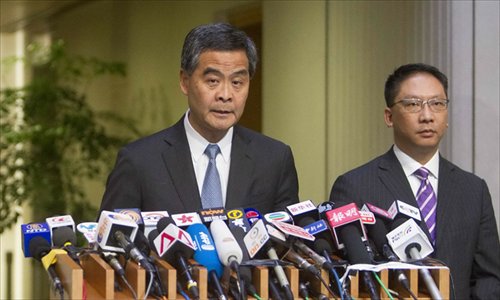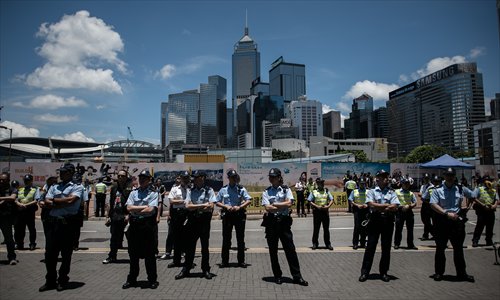NPC condemns Hong Kong veto of election plan
‘Radical lawmakers impede SAR’s democracy’

Hong Kong Chief Executive Leung Chun-ying (left) expresses disappointment after a political reform bill was vetoed by the local legislature on Thursday. Photo: IC

Police officers keep vigil outside Hong Kong's legislature on Thursday. Local lawmakers rejected a political reform package to elect Hong Kong's next leader in 2017. Photo: AFP
China's top legislature on Thursday condemned a few Hong Kong lawmakers for "insisting on their stubborn confrontation against the central authorities," after a reform plan to elect the 2017 Hong Kong chief executive through universal suffrage was voted down by local legislators.
In a strongly worded statement released Thursday afternoon, the National People's Congress (NPC) said these lawmakers, out of their individual interests, have impeded the development of Hong Kong's democracy as well as the stability and prosperity of the special administrative region.
The NPC emphasized that its decision on Hong Kong's electoral reform last August will remain in force in the future, despite the plan having been vetoed Thursday by the Hong Kong Legislative Council (LegCo).
With all pan-democratic lawmakers voting against the reform package put forward by the government on Thursday noon, the proposal was rejected with 28 votes while eight voted for it. The other lawmakers did not cast their vote.
The support of more than two-thirds of the 70 LegCo members was needed to pass the bill.
The results sparked widespread reaction from all sectors across Hong Kong.
Hong Kong Chief Executive Leung Chun-ying said Thursday afternoon that he was extremely disappointed with the result of the vote, as are the Hong Kong government and the public who have been deprived of their right to a democratic election.
Robert Chow-yung, spokesperson for the Alliance for Peace and Democracy, which led a group of hundreds of people to show their support for the reform outside the LegCo building in the last two days, said he was disappointed but not hopeless.
"Society needs a break from political conflicts, and to rethink the future path of Hong Kong, in particular what kind of lawmakers we want for the seats," Chow told the Global Times.
"It's only been months since the government rolled out the proposal and it was put to the vote. This was not enough time for moderate pan-democratic lawmakers to reconsider their position," Michael Tien Puk-sun, a Hong Kong lawmaker, told the Global Times.
The pro-Beijing camp issued a statement after the veto to express their regret and anger over the result. The statement reiterated that all pro-establishment lawmakers firmly support the proposal and they also apologized for their miscalculation in the voting.
The Civic Party's Alan Leong Kah-kit, leader of the pan-democratic camp, admitted that the current political divide has split Hong Kong society. He told the Global Times that the opposition will continue to pursue "genuine universal suffrage," while he hopes the central government will revisit the current political reform plan.
Tien believes that before Hong Kong can solve the current political deadlock, the current administration will continue to be affected by the confrontational attitude of opposition lawmakers. However, he remains hopeful that the city will have another chance to restart political reform in 2016 when new lawmakers have been elected to the LegCo.
"There are moderate pan-democratic lawmakers who wanted to support the reform package, but voted it down under pressure from their counterparts. We may be able to restart the reform in the next term when the radical ones are voted out and moderate lawmakers could unite to support reform," Tien noted.
"The central government would expect the pan-democratic lawmakers to take the first step to accept the current proposal, before it could be further perfected and the current framework can be loosened," noted Tien, who is also an NPC deputy.
Zhu Shihai, a professor specializing in the study of Hong Kong at the Macao University of Science and Technology, told the Global Times that the result of Thursday's vote may trigger the central government to adjust its strategy in Hong Kong affairs.
"The central government can rebuild trust with pan-democratic politicians and activists who strive for democracy," Zhu said. "Differences in political belief can be reconciled as long as it does not affect the sovereignty of the nation."
A Shenzhen-based political commentator, who requested anonymity, told the Global Times that the local opposition parties must realize that "the essence of democracy is to compromise for the greater good," instead of stubbornly clinging on to their unrealistic beliefs.
The Hong Kong and Macao Affairs Office of the State Council said in a statement that the central government will continue to adhere to the principles of One Country, Two Systems, Hong Kong people ruling Hong Kong, and will resolutely support Hong Kong in its path toward the eventual goal of achieving universal suffrage.
Jiang Jie contributed to this story